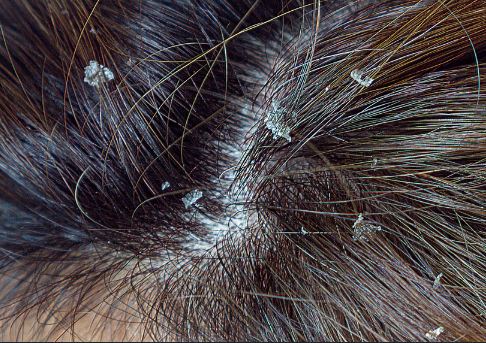Dandruff

Understanding Dandruff: Causes, Symptoms, and Treatments
Introduction
Dandruff is a common scalp condition that causes flaky, white or yellowish skin to appear on the scalp and in the hair. It can be accompanied by itchiness and irritation. While dandruff itself is not harmful, it can be uncomfortable and affect self-confidence. It typically occurs when the scalp becomes too dry or oily, leading to an overgrowth of yeast or irritation.
Causes of Dandruff
- Dry Skin:
- Cold weather or insufficient moisturizing can lead to dry scalp, which causes small, dry flakes of dandruff.
- Oily Skin and Seborrheic Dermatitis:
- Excess Sebum Production: People with oily skin or seborrheic dermatitis (a more severe form of dandruff) often have large, greasy flakes on their scalp, which can also extend to other oily areas like the eyebrows, sides of the nose, and behind the ears.
- Malassezia (Fungus):
- Yeast Overgrowth: Malassezia is a yeast that lives on the scalp. In some people, it can grow excessively, causing irritation, skin cell turnover, and dandruff flakes.
- Irritated or Sensitive Skin:
- Allergic Reaction to Hair Products: Certain shampoos, conditioners, or hair treatments containing harsh chemicals can cause irritation, leading to dandruff.
- Infrequent Shampooing:
- Not washing your hair enough can cause oils and dead skin cells to build up, leading to dandruff.
- Dietary Factors:
- Diets lacking zinc, B vitamins, and certain fats can contribute to dandruff.
- Stress:
- High levels of stress can weaken the immune system and exacerbate dandruff symptoms.
Symptoms of Dandruff
- Flaky Skin: White or yellowish flakes that appear on the scalp and in the hair, and may fall onto the shoulders.
- Itching: Persistent itching on the scalp.
- Dryness or Oily Scalp: Depending on the underlying cause, the scalp may feel dry or greasy.
- Red or Irritated Skin: Seborrheic dermatitis may cause the skin to appear red, especially on oily areas like the scalp, face, or chest.
Home Remedies and Lifestyle Changes for Dandruff
- Use Anti-Dandruff Shampoo:
- Shampoos containing zinc pyrithione, selenium sulfide, salicylic acid, ketoconazole, or coal tar can help control dandruff. Use them regularly and allow the shampoo to sit on the scalp for a few minutes before rinsing.
- Coconut Oil:
- Coconut oil has antifungal properties and can moisturize the scalp. Apply it directly to the scalp and leave it on for 30 minutes before washing it out.
- Tea Tree Oil:
- Tea tree oil has natural antifungal properties. Adding a few drops to your shampoo can help reduce dandruff.
- Aloe Vera:
- Aloe vera can soothe the scalp and reduce inflammation. Apply aloe vera gel directly to the scalp and let it sit for 30 minutes before washing.
- Apple Cider Vinegar:
- Apple cider vinegar can balance the scalp’s pH level and reduce yeast overgrowth. Mix equal parts water and vinegar, apply to the scalp, and rinse after a few minutes.
- Manage Stress:
- Reducing stress through relaxation techniques such as meditation or yoga can help prevent dandruff flare-ups.
- Improve Diet:
- Include foods rich in zinc, omega-3 fatty acids, and B vitamins to promote scalp health.
Clinical Treatments for Dandruff
- Prescription Shampoos:
- For severe cases of dandruff, a doctor may prescribe medicated shampoos containing stronger active ingredients like ketoconazole or coal tar.
- Topical Steroids:
- For seborrheic dermatitis or inflamed scalp, topical corticosteroids may be prescribed to reduce inflammation and itching.
- Antifungal Medications:
- In cases where Malassezia yeast overgrowth is causing dandruff, an antifungal cream or oral medication may be prescribed.
- Phototherapy:
- Light therapy using UV light may be helpful in cases of severe seborrheic dermatitis.
Alternative/Non-Invasive Treatments for Dandruff
For dandruff, the therapies offered by Earl Claytont Wellness Centre that may help improve scalp health and reduce symptoms include:
- Vitamin B Complex:
- B vitamins, particularly B7 (biotin), B6, and B12, are essential for maintaining healthy skin and scalp. A B Complex supplement can help improve scalp health, reduce flakiness, and support hair growth.
- PEMF (Pulsed Electromagnetic Field Therapy):
- PEMF therapy can improve blood circulation to the scalp, reduce inflammation, and promote scalp healing, which may help alleviate dandruff and other scalp-related issues.
- NAD+ Therapy:
- NAD+ therapy supports cellular repair and regeneration, which can help improve the health of the scalp and reduce oxidative stress. It may also help restore the scalp’s natural balance, potentially reducing dandruff.
These therapies can be beneficial in managing dandruff by promoting scalp health, improving circulation, and supporting cellular regeneration.
Discover the perfect treatment for you with a FREE MEDICAL ASSESSMENT! Limited slots available – secure yours now by scheduling an appointment. Click below to book now!
When to Seek Medical Attention
- If dandruff persists despite over-the-counter treatments, or if symptoms worsen and extend beyond the scalp (such as on the face, chest, or back), a healthcare provider should be consulted. A doctor can diagnose any underlying conditions and recommend the most effective treatment.
Conclusion
Dandruff is a common condition that can be effectively managed with proper care and treatments. From home remedies like coconut oil and apple cider vinegar to medicated shampoos, there are many options available for controlling dandruff. Identifying triggers and maintaining a healthy scalp routine are key to reducing symptoms and preventing recurrence.

